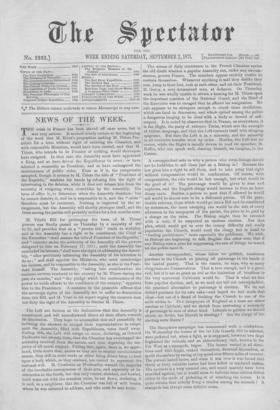A correspondent asks us why a patron who owns livings
should not be forbidden to sell them just as a Bishop is ? Because the law gives him a right to sell them, and to take away that right without compensation would be confiscation. Of course, with compensation, the rule would be fair enough, but what would be the good of it ? The patronage would be given to sons and nephews, and the English clergy would become in time an here- ditary caste. Besides, a patron so poor that if allowed he would sell would be almost sure to be a dishonest patron. Of the prac- ticable reforms, those which would go into a Bill and be considered by statesmen, the most sweeping one would be the sale of every advowson to the ratepayers of the parish, the price to be paid by a charge on the rates. The Bishop might then be invested with a veto, if he suspected an unclean election. But that plan, which would get us over the money difficulty and really popularize the Church, would send the clergy hat in hand to "leading parishioners," more especially the publicans. We wish, as Bishops are beginning to talk English like other men, that if any Bishop sees a plan for suppressing the sale of livings he would let the public have it.






























